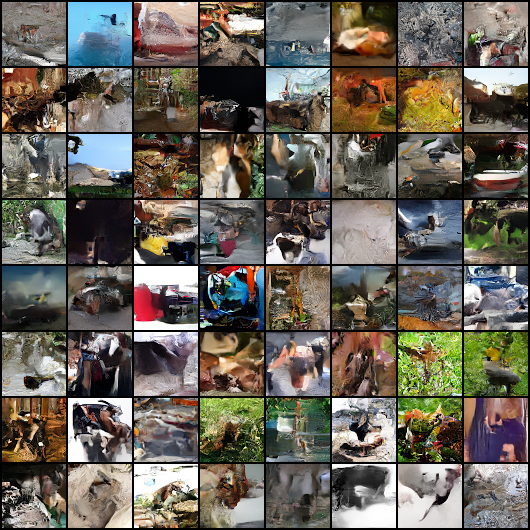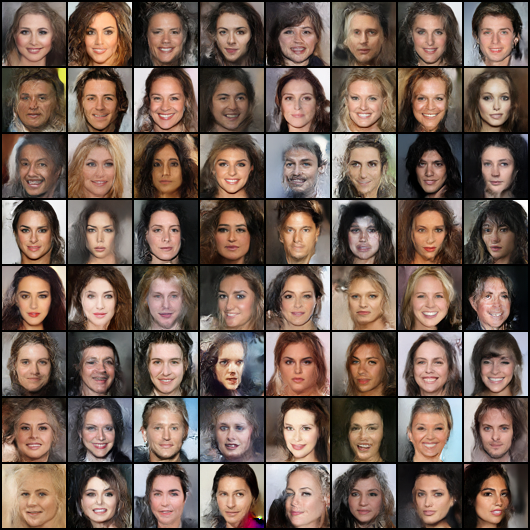Implementation of "Generative Flow with Invertible 1x1 Convolutions" (https://arxiv.org/abs/1807.03039) in Pytorch
For personal study and research, I referred to several Normalizing-Flow repositories and refactored the code to facilitate normalizing flow-related experiments.
- CUDA 11.0
- Python 3.9
- PyTorch 1.11
- others : requirements.txt
git clone https://github.com/dajinstory/glow-pytorch.git
cd glow-pytorch
pip install -r requirements.txt
For training, you need to prepare Dataset and meta file. Meta file for ImageNet and CelebA dataset are in data/{DATASET_NAME}/train_meta.csv. It only contains the file name of dataset.
Also you should edit config files. There are "*_path" named keys. Those keys contains root path of dataset, path of meta file and path to save log and checkpoint files.
You can train model from scratch,
bash script/train/train_glow_64x64_celeba.sh
resume from pretrained checkpoints,
bash script/resume/train_glow_64x64_celeba.sh
and finetune from pretrained weights
bash script/finetune/train_glow_64x64_celeba.sh
You can check the sampling result of the pretrained model by running demo/demo.ipynb
If you want to utilize the Glow model for your personal research, you just need to refer to src/ folder and demo/ folder.
I trained 64x64 model on ImageNet and 256x256 model on CelebA dataset for ???? and ???? iterations, respectively. These models followed the setting from Glow official paper. I got bpd(bits per dimension) about ?? and ?? for each, which are ?? and ?? from official paper. Maybe data preprocessing, training loop could made this difference. I trained 64x64 model with 1 GPU, 64 batch size on each GPU. And I trained 256x256 model with 4 GPUs, 8 batch size on each GPU.
Also I trained 64x64 model on CelebA 64x64 Dataset and trained 256x256 model which has affine-coupling rather than additive-coupling used in official paper. I got bpd(bits per dimension) about ?? and ?? for each.
| HParam | Glow64x64V0 | Glow256x256V0 | Glow256x256V1 |
|---|---|---|---|
| input shape | (64,64,3) | (256,256,3) | (256,256,3) |
| L | 4 | 6 | 6 |
| K | 48 | 32 | 32 |
| hidden_channels | 512 | 512 | 512 |
| flow_permutation | invertible 1x1 conv | random permutation | invertible 1x1 conv |
| flow_coupling | affine | additive | affine |
| batch_size | 64 on each GPU, with 1 GPUs | 8 on each GPU, with 4 GPUs | 8 on each GPU, with 4 GPUs |
| y_condition | false | false | false |
| Model | Dataset | Checkpoint | Note |
|---|---|---|---|
| Glow64x64V0 | ImageNet | Glow64X64V0_ImageNet | Official Setting |
| Glow64x64V0 | CelebA | Glow64X64V0_CelebA | 64x64 CelebA Dataset |
| Glow256x256V0 | CelebA | TBA | Official Setting |
| Glow256x256V1 | CelebA | TBA | additive -> affine |
Sample from 64x64 ImageNet dataset. At ???,??? iterations. (trained on ?.??M images)
Sample from 64x64 CelebA dataset. At ???,??? iterations. (trained on ?.??M images)
Results of different sampling temperatures. (0, 0.25, 0.5, 0.6, 0.7, 0.8, 0.9, 1.0)
Result of z space interpolation
TBA
Sample from 256x256 CelebA dataset, Glow256x256V0. At ???,??? iterations. (trained on ?.??M images)
TBA
Sample from 256x256 CelebA dataset, Glow256x256V1. At ???,??? iterations. (trained on ?.??M images)
If you use this software, please cite it as below.
@software{NF-pytorch,
author = {Dajin Han},
title = {{Framework for Flow-based Model in Pytorch}},
year = {2022},
url = {http://github.com/dajinstory/glow-pytorch}
}
https://github.com/VLL-HD/FrEIA
https://github.com/rosinality/glow-pytorch
https://github.com/y0ast/Glow-PyTorch
https://github.com/chaiyujin/glow-pytorch
@inproceedings{kingma2018glow,
title={Glow: Generative flow with invertible 1x1 convolutions},
author={Kingma, Durk P and Dhariwal, Prafulla},
booktitle={Advances in Neural Information Processing Systems},
pages={10215--10224},
year={2018}
}
@inproceedings{nalisnick2018do,
title={Do Deep Generative Models Know What They Don't Know? },
author={Eric Nalisnick and Akihiro Matsukawa and Yee Whye Teh and Dilan Gorur and Balaji Lakshminarayanan},
booktitle={International Conference on Learning Representations},
year={2019},
url={https://openreview.net/forum?id=H1xwNhCcYm},
}
@software{freia,
author = {Ardizzone, Lynton and Bungert, Till and Draxler, Felix and Köthe, Ullrich and Kruse, Jakob and Schmier, Robert and Sorrenson, Peter},
title = {{Framework for Easily Invertible Architectures (FrEIA)}},
year = {2018-2022},
url = {https://github.com/VLL-HD/FrEIA}
}





